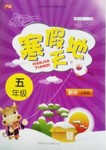题目内容
The incident of Sanlu milk powder happened in September,2008 , _________ many countries in the world paid close attention to.
![]() A. that B. when C. which D. what
A. that B. when C. which D. what

 寒假天地重庆出版社系列答案
寒假天地重庆出版社系列答案根据短文内容,从短文后的选项中选出能填入空白处的最佳选项。选项中有两项为多余选项。
Laughter and tears are part of living. But do you find enough time for laughter? I am not
asking if you experience lots of good times. Of course we should laugh during the happy times.
1
Erma Bombeck is known for her humorous books, but she wrote one that covered a more
serious topic: cancer in children. Erma talks with lots of children with cancer and learns an important life lesson from them. 2
She tells the experience of 15-year-old Jessica from Burlington, VT. Jessica’s leg was amputated (锯掉) at the knee because of cancer. Jessica tells about playing soccer. She kicked the ball hard and it flew off in one direction while her artificial leg flew another way. Then “the tall, pretty person that I am,” she said, “sat on the floor in laughter.”
Jessica may not have laughed about her cancer, but she laughed about dealing with its results. 3
Then there is the story of 17-year-old Betsy. She made her way to the radiation room(放射室) for
her regular radiation therapy. As usual, she dropped her hospital coat and, wearing only her birthday suit, climbed onto the table and waited. After a couple of moments she began to realize something disturbing: the extra people in the room were not the medical students she had thought, but rather painters giving an estimate on painting! 4 And like Jessica, her ability to laugh helped her to deal with one of the most difficult things a young person can endure(忍受) — cancer.
There is a time to weep and a time to laugh. 5 And you’ll smile at the end.
| A.She was learning to wear an artificial leg. |
| B.And her laughter helped her cope. |
| C.You would be happy if you find reasons to laugh. |
| D.Betsy laughed heartily about the incident. |
F. If you can laugh even when the going gets rough, you’ll make it.
G. She learns that all cancer survivors prefer to laugh.
As poets go, Robert Frost was no longer young when he published his first book of poems, A Boy's Will, in 1913. Though born in San Francisco, he came of a New England family which returned there when he was ten. Like many other writers, he had a brief brush with college and then supported himself by trying different jobs. However, he had been brought up on a farm and he liked farming. Most of all, he liked to write but he could not support himself by writing. In his late 30s he moved to England, where he produced his first book.
At the outbreak of World War I, Frost went back to farming in New Hampshire. Thereafter, although he made many journeys elsewhere, he considered the farm to be his home and its activities became the focus of his poetry.
Frost's verses(诗, 诗体) are a part of a great tradition, shaped by the Roman poet Vergil, whose poetry was mainly about farming. However, though he used farm situations in much of his poetry, he gave them a wide application. He might write about stepping on a rake(耙子) and describe the feeling when it hit him, but he used the incident to show how life gave us lessons.
Some talents in poetry are used up early, but not Frost's. He continued to publish fine poetry for fifty years. He reached the height of his popularity after World War II. If America had a national poet in the 20th century, it was Frost. He was chosen to read one of his poems at the inauguration(就职典礼)of the late President John F. Kennedy, the first poet ever so honored.
The 1.__________ of Robert Frost
|
Personal Information |
Nationality |
American |
Topic of poetry |
2.__________ |
|
Career |
3._____ |
Favorite |
Writing |
|
|
4.____________ |
Born into a 5.__________ Having a brief brush with college Trying different jobs6._________Publishing his first book of poem in7.___________ Reaching the height of his popularity after 8._____________ |
|||
|
Achievements or honors |
Publishing fine poetry continually for fifty years Being regarded as9.____________ Being 10.___________to be chosen to read one of his poems at the inauguration of an American President |